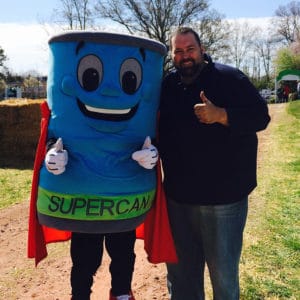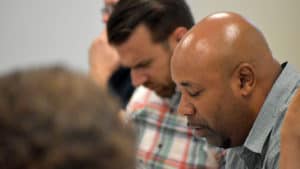“We laid our souls bare…we began to discuss our preconceived notion[s], experiences, and prejudices that we came in with, and we kind of just walked through this process of, historically, how did we get here,” expounded the BRN’s Director of Healthy Churches Dr. Larry Anderson about the Culture Ethics and Justice Coalition (CEJC).
The Culture Ethics and Justice Coalition is an organization made up of roughly 14 pastors in the greater Philadelphia area, who started meeting in 2017 to address systemic injustice. The effort has sought to bring racial understanding and a united mission among churches in the area.
“It was something that was spurred and pushed by our now Executive [Director] Barry Whitworth. He wanted to deal with racial reconciliation,” Anderson explained.
“We went from a very uncomfortable environment, from having some difficult conversations – we saw repenting, we saw tear dropping – but we got to a point where we could ask simple questions.”
Prior to his involvement with the CEJC or the BRN, Anderson attended Biblical Theological Seminary (now known as Missio Seminary) in Hatfield, Pennsylvania. After graduating at Missio, he became the seminary’s first ever African American professor.
For the past eight years, he has served as a BRN director, while also serving the past 17 years as the pastor of Philadelphia’s Great Commission Church, where he also leads a racial reconciliation effort on behalf of the BRN.
“I’ve been dealing with racial reconciliation for 20 years. I’ve grown tired of having racial reconciliation conversations. I think it’s something that should have already been done,” said Anderson.
However, despite his initial feelings towards the reconciliation effort, Anderson has seen growth within this community of pastors.
“When Christ prayed in John 17 that we would be one, as He and the Father is one, it wasn’t saying that we would have uniformity, but it was saying that there would be a level of unity.”
Anderson continued: “I think we’ve done that with our PA and South Jersey pastors, and I’ve been blown away by how far we’ve come – to come to a point of having a level of trust, a level of respect, a level of love at the table [and] bring a comforting situation where you [have] a brother of ethnicity you can ask anything.”
Anderson explained how Whitworth eventually stepped aside from leading the effort and moved him into the leadership role.
“He [Whitworth] got to this point where he’s like, ‘I trust you to lead us and move forward in this’ and that was significant for me,” said Anderson.

Buff McNickle, a fellow BRN director and member of the CEJC, also commented on the impact the organization has had on its members and himself.
“When I think back to that conversation, when we first entered into the CEJC, I needed to change. I thought, ‘Well, I’m good…I’m okay,’ but God has used men like Dr. Anderson and other men around that table.”
McNickle, an Anglo pastor who has adopted three Black children, continued: “There is so much I need to learn, there is so much I need to gather…and if I’m really [going to] do compassion ministry in our culture and our context, I gotta come from a humility standpoint.”
McNickle is originally from Mobile, Alabama, and serves as the BRN’s Director of Network Development and Compassion Ministries. He is currently the pastor of Grace Falls Church in Absecon, New Jersey, which he planted back in 2013.
“When I think of compassion ministry, I think of a bridge-building ministry. We’ve got to build bridges within our community by identifying needs, seeing those needs, and meeting those needs,” said McNickle, sharing more about his role in compassion ministries, as well as how to meet community needs.
“My role in compassion ministry is to help us understand how to build those bridges. So that, relationally, that bridge is strong enough when we have opportunities to share the Gospel.”
He explained, “The body of Christ – the church – has the resources we need to meet those needs and to come alongside our communities, come alongside our cities and neighborhoods, and really bring the hope, the light, and the transformative power of the Gospel – if we get out of the building to do that.”
As key leaders in the BRN and members of the CEJC, both Anderson and McNickle touched on the importance of racial reconciliation conversations, and bringing the Gospel to the forefront of those types of discussions.

“I think it starts with the Gospel. I think if you start in Genesis – you read that the Lord created man in His image and in His image he created male and female – if you start there…if He created all of mankind in His image, and we’re all image bearers, then there’s a certain way we all have to treat one another,” said Anderson.
“I think the injustice, and all these things that we see systemically, would change when our hearts change, because there’s a winner and a loser. If the winner is man, nationality, or race then everybody else is a loser, but if the winner is God….we all become winners.”
McNickle agreed, “Well, I think the first thing people have to do is recognize and acknowledge that there is injustice, and then the second thing you gotta do is identify it and speak to it.”
He continued: “I think so many people, when they want to look at injustice, they want to look ahead, but we gotta be willing to look back, and where we look back to is the Gospel.”
Listen to the podcast interview:
The “50 Stories of Transformation” series, told in honor of the Baptist Resource Network’s 50th anniversary, highlights the many ways God has moved throughout Pennsylvania, South Jersey and beyond. Your generous support of the Cooperative Program makes this ministry possible and fuels evangelism and outreach in our local churches and all over the world! Thank you!